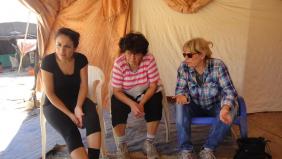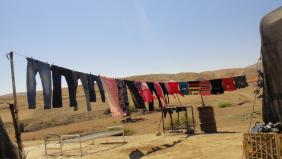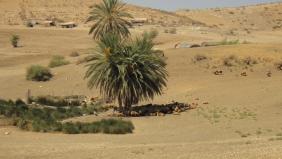Palestinian Jordan Valley, 22.9.2015, Eve of Yom Kippur (Day of Atonement)


7:30 Tapuach Junction – Zaatara Checkpoint
Checkpoint active, cars travelling from the north (Nablus) southbound (to Jerusalem and Ramallah) are inspected, and a long waiting line drags southwards. 2 soldiers stationed near the hitchhikers post going south, police jeep parked on the road divide.
Because of our many assignments, and the shortness of the day (Rajaa had to make it back to Jaffa before Yom Kippur begins, for stones are thrown there on any moving vehicles, especially Arabs) – we did not stop.
Maale Efrayim Checkpoint - unmanned.
Fassail – we visited Ali’s family. No change. Last week we made the mistake of intervening in the family’s problems (first wife – second wife etc.) after the first wife turned to us for help.
Hamra – Bekaot - Checkpoint– hardly any vehicles, nor soldiers visible, and the few cars arriving crossed uninspected. Suddenly a soldier emerged from the shaded area, so there was a soldier there, but no others seen. Hardly any Palestinians either. Only a single lane was being used, alternately.
Makhoul– on video Rajaa interviewed Najia Basharat and we proceeded to the village center. We found a large UNRWA truck there, several UN vehicles and many UN employees. Apparently every 3 months the tent dwellers of the Palestinian Jordan Valley are allotted donations of basic food stuffs: oil, check peas, lentils, salt, and a sack of flour for every 2 people. We met our friend B. and asked whether he intends to slaughter a sheet for the holiday. He said he was not going to – he has two daughters in the university and no money for such luxuries. In the holiday his wife and children will stay in Tamun with their extended family, and he will be on his own in Makhoul.
Umm Jamal (Ein Al Hilwa)

–this is a firing zone. The entire northern Palestinian Jordan Valley – except for the Jewish settlements, naturally – is a firing zone. All Palestinians in the region are living inside a firing zone. They may be shot, expelled, evicted for a day or a week, and anything may be confiscated from there: their bony cows, sheep, belongings, and the greatest pleasure – their home may be demolished. The Ka’abana family like all other tent dwellers in the area have no water. All the water has been taken by Mekorot (Israel National Water Company) and given to the Jewish settlers. The Palestinians are not allowed to dig a well or even a water cistern for gathering rainwater. A month ago, in the height of summer, Sliman’s tractor and water tanker were confiscated. He is forced to pay 4000 NIS to get them back, plus 1000 NIS for the tow truck, because it was towed to Tzufim, at the other end of the West Bank (near Qalqilya). On September 16 the tractor which Sliman and his brother use for work was confiscated once again. This tractor is used mainly to bring water to their 22 children (11 each, including a 6-month baby ) and their elderly mother. Apparently, in addition to the authorities’ wish to remove Sliman and his family, this has become a profitable business: every month or two this hungry family may be milked anew and with the generous help of the women of Machsomwatch, another several thousand Shekels can be extorted from it, until they will have had enough and leave.
) and their elderly mother. Apparently, in addition to the authorities’ wish to remove Sliman and his family, this has become a profitable business: every month or two this hungry family may be milked anew and with the generous help of the women of Machsomwatch, another several thousand Shekels can be extorted from it, until they will have had enough and leave.
The Ka’abana family has already been expelled in the past – from the South Hebron Hills, and then from Al Ujja, and has been situated here for the past 15 years. 15 years of repeated demolitions (the two last ones took place on January 31, 2014 and on January 1, 2015), confiscations of equipment and livestock, gunfire, military maneuvers, live shells, and as dessert – plain harassment by the security official of the Jewish settlement Maskiyot.
And still, the family’s compound is neat, shining, the children clean and groomed (one daughter is a highly talented photographer) and they are all wonderfully friendly, smiling and courteous.
We can donate and donate, but the hardship of withstanding this daily unceasing whip and yoke of occupation is the burden that these people have to bear. Yesterday was Yom Kippur, and I wish to repeat Tzviya’s words – how could we ever atone for all of this?
Incidentally, the report handed Sliman of the confiscation of his tractor is evidence of the total disregard of the local inhabitants by the authorities – even a minor thing such as writing a report is too much of an effort: the report does not mention to whom it is given, the ID number of the tractor’s owner, who used it, and is signed “Avi”. Simply Avi. No rank, no surname, for Avi is in charge here!
At Zaatara Junction Tapuach Checkpoint, as on our way here, we see many Border Policemen. Palestinians are being held up at the checkpoint on their way to get ready for their holiday, or to work, or simply to a meeting. Again, soldiers at the hitchhikers stop and at the army post above. Again we didn’t stop as we hurried home before Yom Kippur is upon us.
